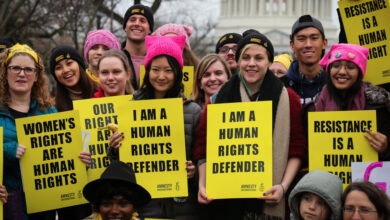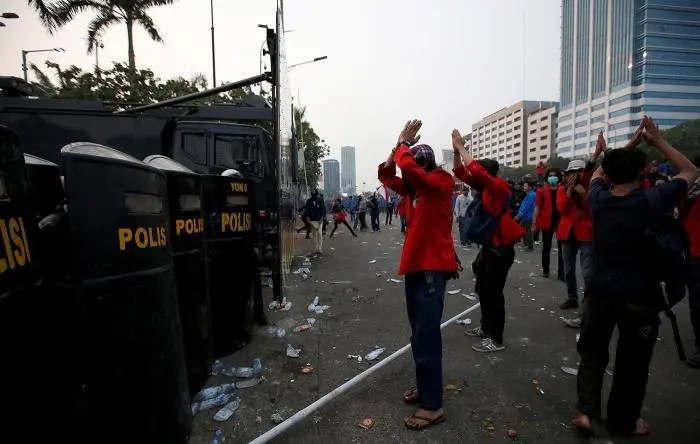
Indonesia and Human Rights: A Journey Through Time
Indonesia and human rights are inextricably linked, forming a complex narrative that spans centuries. From the colonial era to the present day, the nation’s journey has been marked by both progress and challenges in upholding fundamental human rights. This blog delves into the historical context, explores current challenges, and examines the legal framework, institutions, and civil society’s role in shaping Indonesia’s human rights landscape.
This exploration will touch upon key issues such as freedom of speech, assembly, and religion, as well as the challenges posed by discrimination, inequality, and environmental concerns. We’ll examine the Indonesian Constitution and relevant laws, the effectiveness of human rights institutions, and the impact of international engagement on Indonesia’s human rights trajectory.
Historical Context of Human Rights in Indonesia
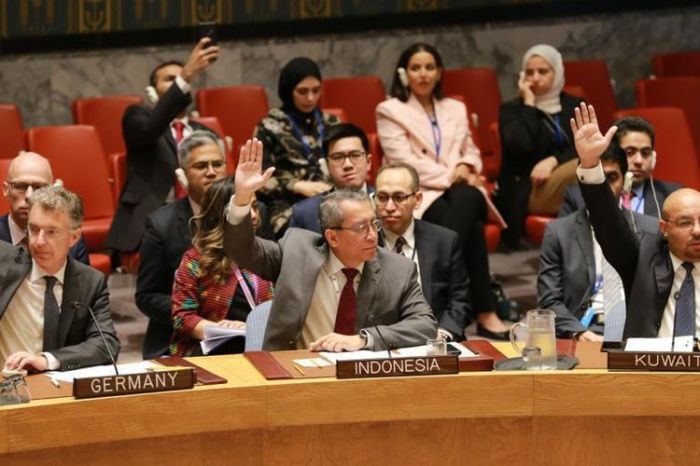
Indonesia’s human rights journey is a complex tapestry woven with threads of pre-colonial traditions, colonial oppression, revolutionary struggles, and post-independence challenges. Understanding this historical context is crucial to appreciating the current state of human rights in the country and the ongoing efforts to uphold them.
Pre-Colonial Traditions and the Influence of Islam
Prior to Dutch colonization, various indigenous communities in Indonesia had their own systems of governance and social norms. These systems often emphasized principles of justice, equality, and community well-being. The arrival of Islam in the 13th century further shaped Indonesian society, introducing concepts of human dignity, social responsibility, and the rule of law.
Indonesia, a nation with a rich cultural tapestry and a diverse Muslim population, often grapples with issues surrounding human rights. While progress has been made, challenges remain, particularly in addressing discrimination and intolerance. It’s interesting to note that even in countries like the United States, where Muslims are often portrayed as a monolithic group, efforts to present a more nuanced view, like those seen in the “Muslim as apple pie” videos , are met with skepticism.
This skepticism reflects the complex and often polarized discussions surrounding Islam and Muslim identity in the West, and underscores the importance of fostering understanding and empathy across cultural and religious divides. Indonesia, like many other nations, must navigate these complexities as it strives to create a society where all individuals, regardless of their faith, can live in dignity and freedom.
The Impact of Dutch Colonialism
Dutch colonialism, which lasted for centuries, had a profound impact on human rights in Indonesia. The Dutch implemented policies that aimed to exploit Indonesia’s resources and suppress any form of resistance. This led to the systematic violation of basic human rights, including:
- Exploitation of Labor:The Dutch forced Indonesians to work on plantations and in mines under harsh conditions, often with little pay or recognition.
- Land Seizure:Indigenous communities were deprived of their land, leading to displacement and dispossession.
- Suppression of Freedom of Expression:The Dutch imposed strict censorship and prohibited any form of dissent or criticism of their rule.
- Cultural Suppression:Traditional Indonesian customs and practices were often discouraged or banned, leading to the erosion of cultural identity.
The Indonesian Revolution and the Promise of Human Rights
The struggle for independence from Dutch rule, known as the Indonesian Revolution (1945-1949), was a pivotal moment in the country’s history. The revolution was fueled by a desire for self-determination and a commitment to human rights. The 1945 Constitution, which was adopted during the revolution, enshrined fundamental human rights, including the right to life, liberty, and security of person.
Human Rights Violations During the Suharto Era
The Suharto regime, which ruled Indonesia from 1966 to 1998, witnessed widespread human rights violations. Suharto’s authoritarian rule was characterized by:
- Political Repression:Opposition groups and political activists were systematically silenced, imprisoned, or disappeared.
- Restrictions on Freedom of Speech and Press:The media was tightly controlled, and dissenting voices were suppressed.
- Human Rights Abuses in East Timor:The Indonesian military’s occupation of East Timor (1975-1999) resulted in widespread human rights violations, including killings, torture, and displacement.
- Corruption and Inequality:Suharto’s regime was marked by rampant corruption, which fueled economic inequality and social unrest.
The Legacy of Human Rights Violations
The human rights violations committed during the Suharto era have had a lasting impact on Indonesian society. These violations have left deep scars, leading to:
- Lack of Trust in Government Institutions:Many Indonesians still distrust the government and its ability to protect their rights.
- Fear of Repression:The legacy of repression has created a culture of fear, where people are hesitant to speak out against injustice.
- Impunity for Perpetrators:Many perpetrators of human rights abuses have not been held accountable for their actions.
Current Human Rights Challenges in Indonesia: Indonesia And Human Rights
Indonesia, a nation renowned for its vibrant culture and diverse population, faces significant human rights challenges in the 21st century. While progress has been made in certain areas, persistent issues related to fundamental freedoms, discrimination, and environmental protection continue to pose a complex landscape for human rights advocacy.
This section explores the current state of human rights in Indonesia, focusing on the challenges faced in various domains.
Freedom of Speech, Assembly, and Religion
Freedom of expression is a cornerstone of any democratic society, and Indonesia’s constitution guarantees this right. However, the practical application of these freedoms remains a subject of debate. In recent years, there have been instances where individuals have faced legal repercussions for expressing dissenting views or criticizing government policies.
This includes the use of laws such as the Electronic Information and Transactions Law (UU ITE) to silence critics and suppress freedom of expression.The right to assemble peacefully is also enshrined in the Indonesian constitution. Nevertheless, authorities often restrict public gatherings, particularly those deemed politically sensitive or critical of the government.
This includes the use of excessive force by security personnel during protests and the imposition of restrictions on the activities of civil society organizations.Indonesia is a predominantly Muslim country with a diverse religious landscape. While the constitution guarantees freedom of religion, religious minorities, particularly those outside the six officially recognized religions, often face discrimination and persecution.
This includes instances of violence, intimidation, and restrictions on religious practices.
Discrimination and Inequality, Indonesia and human rights
Discrimination and inequality based on ethnicity, religion, and gender remain significant challenges in Indonesia. Ethnic and religious minorities, such as Papuans, Chinese Indonesians, and Ahmadiyya Muslims, continue to experience systemic discrimination and marginalization. This includes limitations on access to education, employment, and political participation.Gender inequality is also deeply rooted in Indonesian society.
Indonesia’s human rights record is a complex issue, with ongoing debates about freedom of expression and the treatment of minority groups. It’s crucial to be aware of how these issues are portrayed in the media, as the narrative can be heavily influenced by mainstream media and propaganda.
Understanding the role of media in shaping public opinion is vital for advocating for human rights in Indonesia and ensuring a balanced perspective on the situation.
Women continue to face discrimination in various aspects of life, including in the workplace, in access to education and healthcare, and in political representation. Domestic violence remains a pervasive issue, and legal protections for women’s rights are often inadequate.
Environmental Protection, Labor Rights, and Indigenous Rights
Indonesia’s rapid economic growth has come at a significant cost to the environment. Deforestation, illegal logging, and mining activities have led to widespread environmental degradation and threaten the livelihoods of indigenous communities. The government’s commitment to environmental protection is often challenged by economic interests, and enforcement of environmental regulations remains weak.Labor rights are another area of concern in Indonesia.
Despite legal protections, workers in various sectors, particularly in the informal economy, face exploitation, poor working conditions, and limited access to labor rights. This includes issues such as low wages, forced labor, and the lack of freedom of association.Indigenous communities in Indonesia face numerous challenges related to land rights, resource access, and cultural preservation.
They are often marginalized and excluded from decision-making processes that affect their lives and livelihoods. Land grabbing, illegal logging, and mining activities continue to threaten their traditional territories and cultural heritage.
Legal Framework and Institutions
Indonesia’s legal framework for human rights is built on a foundation of international and domestic instruments. The Constitution, various laws, and dedicated institutions contribute to the protection and promotion of human rights.
The Indonesian Constitution and Human Rights
The 1945 Constitution of Indonesia serves as the bedrock for human rights protection. It enshrines fundamental rights such as the right to life, liberty, and security of person; freedom of thought, conscience, and religion; and equality before the law. These rights are further elaborated in various laws and regulations.
Key Laws and Regulations
- Law No. 39 of 1999 on Human Rights: This law defines human rights, establishes the National Human Rights Commission (Komnas HAM), and Artikels the mechanisms for protecting and promoting human rights.
- Law No. 26 of 2000 on Human Rights Courts: This law establishes special courts to handle cases related to gross human rights violations.
- Law No. 12 of 2005 on the Ratification of the International Covenant on Civil and Political Rights: This law incorporates the ICCPR into Indonesian law, further strengthening the legal framework for human rights.
The National Human Rights Commission (Komnas HAM)
The National Human Rights Commission (Komnas HAM) is an independent institution established by Law No. 39 of
1999. It plays a crucial role in protecting and promoting human rights in Indonesia. Its key functions include
- Investigating alleged human rights violations
- Recommending policies to improve human rights protection
- Monitoring the implementation of human rights laws and regulations
- Educating the public about human rights
Komnas HAM’s effectiveness is often debated. While it has made significant contributions to raising awareness and advocating for human rights, its ability to enforce its recommendations and hold perpetrators accountable remains limited.
Impact of International Human Rights Treaties
Indonesia has ratified numerous international human rights treaties, including the International Covenant on Civil and Political Rights (ICCPR), the International Covenant on Economic, Social and Cultural Rights (ICESCR), and the Convention on the Elimination of All Forms of Discrimination against Women (CEDAW).
These treaties have a direct impact on Indonesian law and practice.
Indonesia’s human rights record is a complex and evolving issue, with progress made in some areas but challenges remaining in others. It’s important to note that human rights are not a singular issue, and understanding the context of the region is crucial.
For instance, the situation in the Middle East, which has been a hotbed of conflict and instability for decades, can provide valuable insight into the dynamics that shape human rights globally. More information on the middle east can help us understand the global context in which Indonesia’s human rights situation exists.
Ultimately, addressing human rights violations in Indonesia requires a nuanced approach that considers the unique challenges of the country and its place within the wider global landscape.
- Incorporation into Domestic Law: Ratification of these treaties often involves incorporating their provisions into Indonesian law, thereby strengthening the legal framework for human rights.
- Influence on Judicial Decisions: Indonesian courts often refer to international human rights standards in their decisions, demonstrating the growing influence of international law on domestic jurisprudence.
- Increased Scrutiny and Accountability: Ratification of these treaties subjects Indonesia to international scrutiny and accountability mechanisms, which can pressure the government to improve its human rights record.
Civil Society and Human Rights Advocacy
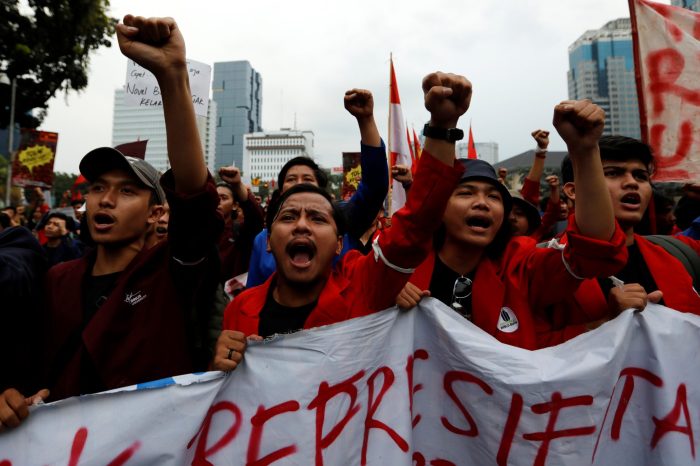
Civil society plays a crucial role in promoting human rights in Indonesia, acting as a vital watchdog and advocate for change. NGOs, human rights defenders, and activists work tirelessly to address human rights violations, raise awareness, and push for legal reforms.
This section examines the strategies and challenges faced by these actors in their pursuit of a more just and equitable society.
Strategies Employed by Human Rights Activists
Human rights activists in Indonesia employ a diverse range of strategies to advance their cause. These strategies are often tailored to the specific context of the human rights issue at hand and the prevailing political landscape.
- Documentation and Monitoring:NGOs play a critical role in documenting human rights violations, gathering evidence, and monitoring the implementation of human rights laws. This information is used to expose abuses, hold perpetrators accountable, and advocate for policy changes.
- Public Awareness Campaigns:Raising public awareness is a key strategy for human rights advocacy. NGOs conduct educational campaigns, workshops, and public forums to inform the public about human rights issues and mobilize support for their cause.
- Legal Advocacy:Legal advocacy is crucial for challenging human rights violations and securing justice for victims. NGOs provide legal assistance to victims, file lawsuits, and participate in legal proceedings to ensure accountability and redress.
- Lobbying and Advocacy:NGOs engage in lobbying efforts to influence policy decisions and promote human rights-friendly legislation. This includes advocating for changes to laws, policies, and practices that violate human rights.
- International Advocacy:International advocacy involves engaging with international organizations, governments, and human rights bodies to raise awareness of human rights issues in Indonesia and seek support for reforms.
Challenges Faced by Human Rights Activists
Human rights advocacy in Indonesia is not without its challenges. Activists face various obstacles in their work, including:
- Restrictions on Freedom of Expression and Assembly:The Indonesian government has been known to restrict freedom of expression and assembly, making it difficult for activists to organize protests, disseminate information, and criticize the government.
- Intimidation and Harassment:Human rights defenders are often subjected to intimidation, harassment, and threats from government officials, security forces, or other actors. This can discourage activism and create a climate of fear.
- Lack of Funding:Funding is a major challenge for many NGOs, especially those working in remote areas or on sensitive issues. Limited resources can hamper their ability to conduct effective advocacy work.
- Lack of Access to Justice:The Indonesian legal system can be challenging for victims of human rights violations to navigate, particularly for those from marginalized communities. This can make it difficult to seek justice and hold perpetrators accountable.
- Corruption and Impunity:Corruption and impunity are significant problems in Indonesia, which can undermine the effectiveness of human rights advocacy. Perpetrators of human rights violations often escape punishment, discouraging victims from seeking justice and creating a culture of impunity.
Key Human Rights Campaigns and Initiatives
Civil society has spearheaded numerous human rights campaigns and initiatives in Indonesia, addressing a wide range of issues.
- Campaign for the Abolition of the Death Penalty:Numerous NGOs and activists have been actively campaigning for the abolition of the death penalty in Indonesia, highlighting its inhumanity and arguing for alternative punishments. The campaign has gained momentum in recent years, with a growing number of people and organizations supporting the abolition of capital punishment.
- Advocacy for the Rights of Indigenous Peoples:Indigenous communities in Indonesia face various human rights challenges, including land grabbing, forced displacement, and discrimination. NGOs have been actively advocating for their rights, promoting self-determination, and working to protect their traditional lands and cultural practices.
- Campaign for Freedom of Expression and Assembly:NGOs have been at the forefront of campaigns to defend freedom of expression and assembly in Indonesia. They have challenged laws and policies that restrict these rights, organized protests, and supported individuals who have been persecuted for their views.
- Advocacy for the Rights of Women and Children:Women and children in Indonesia face various forms of discrimination and violence. NGOs have been working to promote their rights, including access to education, healthcare, and economic opportunities. They also advocate for policies to prevent violence against women and children and provide support services for victims.
- Campaign for Environmental Justice:Environmental degradation and climate change are significant challenges facing Indonesia. NGOs have been advocating for environmental justice, promoting sustainable development, and holding corporations accountable for their environmental impact.
International Engagement and Human Rights
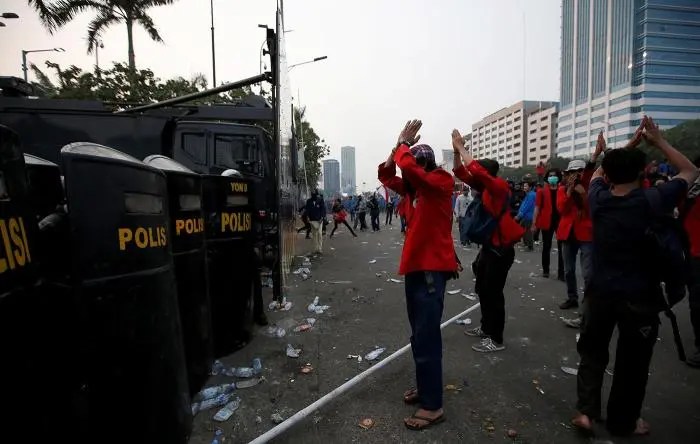
Indonesia’s commitment to human rights extends beyond its domestic sphere, actively engaging in international human rights mechanisms and collaborating with global actors. This engagement reflects Indonesia’s recognition of the interconnectedness of human rights and its desire to contribute to a world where human rights are universally respected.
Indonesia’s Role in International Human Rights Mechanisms
Indonesia’s participation in international human rights mechanisms demonstrates its commitment to upholding human rights standards. The country actively engages with various UN bodies, including the UN Human Rights Council, where it has served as a member since
2006. Indonesia’s participation in these mechanisms provides a platform for
- Promoting human rights:Indonesia advocates for the promotion and protection of human rights through its participation in UN Human Rights Council sessions and by contributing to the development of international human rights instruments.
- Reporting on human rights progress:Indonesia submits regular reports to the UN Human Rights Council and other relevant bodies, detailing its efforts to implement human rights obligations and address human rights challenges. These reports provide transparency and accountability.
- Engaging in constructive dialogue:Indonesia participates in interactive dialogues with UN Special Procedures mandate holders, engaging in constructive dialogue on specific human rights issues and receiving recommendations for improvement.
Impact of International Pressure and Scrutiny
International pressure and scrutiny have played a significant role in influencing human rights practices in Indonesia. The international community’s focus on human rights issues has led to:
- Increased accountability:The scrutiny of international organizations has increased accountability for the Indonesian government’s human rights record. This pressure has encouraged the government to address human rights concerns and implement reforms.
- Improved legal framework:International pressure has contributed to the strengthening of Indonesia’s legal framework for human rights protection. For instance, the ratification of international human rights treaties and the adoption of domestic laws aligned with international standards have been influenced by external pressure.
- Enhanced civil society engagement:International attention has empowered civil society organizations in Indonesia to actively engage in human rights advocacy. Increased international support has provided resources and platforms for civil society to raise awareness and demand accountability.
Areas of Cooperation and Collaboration
Indonesia collaborates with various international human rights organizations, including:
- UN agencies:Indonesia works closely with UN agencies such as the Office of the High Commissioner for Human Rights (OHCHR) and UNICEF to implement human rights programs and receive technical assistance.
- International NGOs:Indonesia collaborates with international NGOs like Amnesty International and Human Rights Watch to promote human rights and address human rights violations.
- Regional organizations:Indonesia engages with regional organizations like ASEAN and the Asia-Pacific Forum on Human Rights to foster regional cooperation and promote human rights standards in the region.





